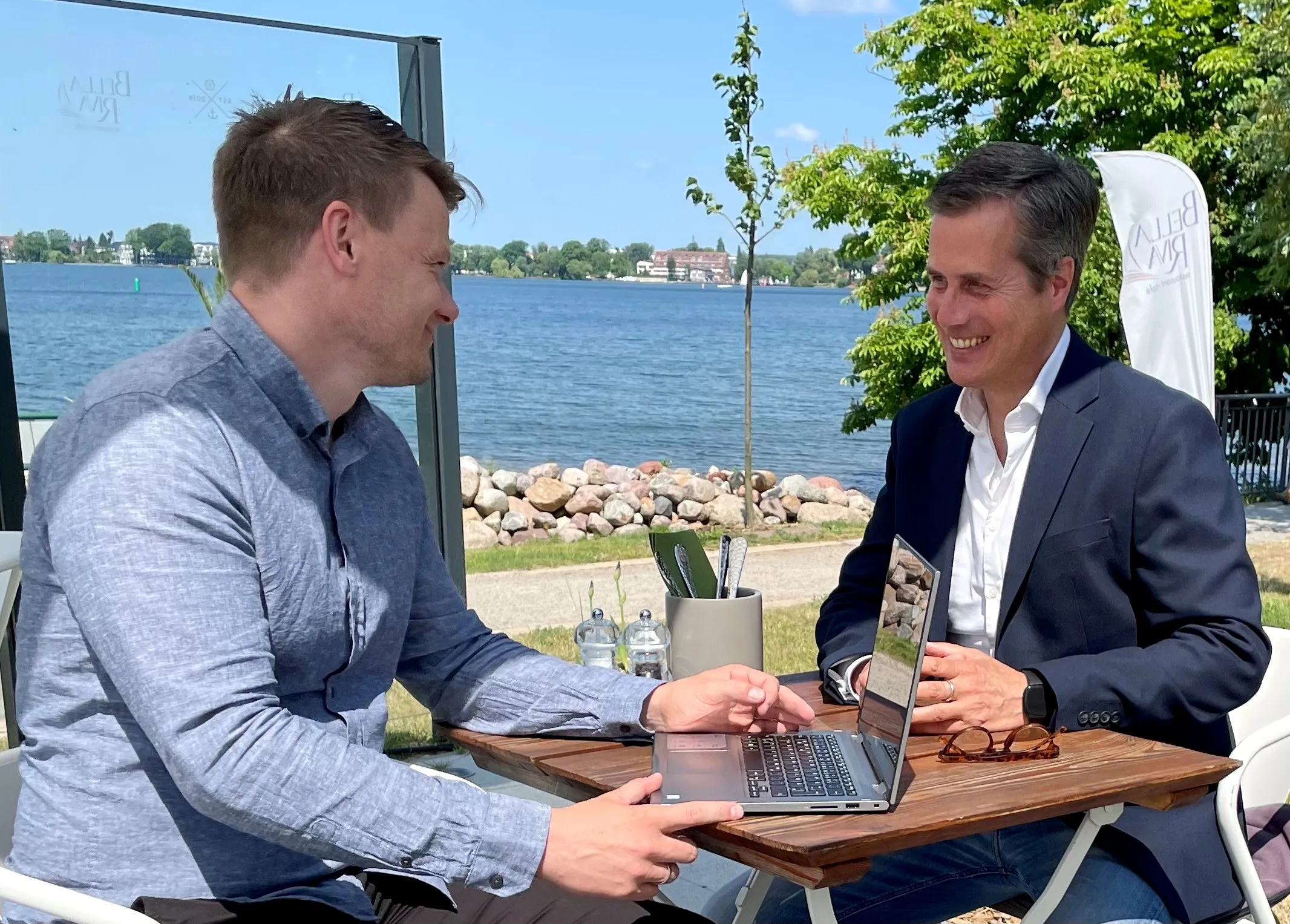Headhunter Heiko Mühle on application processes and candidate mistakes
A successful application process can be the key to your next career opportunity. However, many applicants often make avoidable mistakes that reduce their chances. In our interview with an experienced headhunter, you will gain valuable insights into little tricks and common mistakes in application processes. These expert perspectives and insights can help you to optimize your application documents, master job interviews with confidence and avoid typical pitfalls. Use these valuable tips to set yourself apart from other applicants and secure your dream position.

What criteria are most important to you when evaluating applicants for a position?
At the risk of coming across as a smart aleck, I would first like to mention that for us headhunters, an applicant is someone who applies for an advertised position on their own initiative. Therefore, in our core business of direct approach, we tend to speak of "candidates". These are specifically selected and often checked for specific positions, even if they have not actively applied for a job.
First and foremost, of course, we look at their professional qualifications. We carefully check whether the candidate has the necessary specialist knowledge and professional experience relevant to the position. Particularly important here are successful projects and demonstrable achievements that plausibly underpin the skills and successes initially expressed by the candidate.
However, cultural fit is just as crucial for long-term and successful collaboration. Soft skills such as communication skills, adaptability and problem-solving skills are also important. I also look at the candidate's motivation and long-term goals to ensure that their professional ambitions are in line with the company's strategic objectives. After all, it is of no use to my client to hire a top candidate for their marketing management vacancy if they are planning to travel the world or breed guinea pigs a year later.
It's really amazing how often people make the mistake of not asking relevant questions.
heiko Mühle
Personnel consultantWhat common mistakes do applicants make during the application process?
One problem that we unfortunately still see very often is inadequate preparation for the interview, both with us and - fortunately less frequently - later with the client. The latter is then perceived by the client as a lack of commitment and the subsequent process is usually negative. I strongly advise careful preparation, which includes researching the company and the specific position. And I also always say: "Bring a handful of your own questions to the interview!" It really is amazing how often people make the mistake of not asking relevant questions.
Equally important is a clear and well-structured CV (without spelling mistakes, of course!) that highlights relevant experience and achievements. For certain positions, a weak online presence, especially on platforms such as LinkedIn, can also lead to disturbing feelings on the part of the customer. Not for a heart surgeon, of course, but for someone working in digital media sales, for example, a professional and up-to-date online self-presentation is essential.
Inadequate communication, flippancy, excessive response times or unanswered emails and unclear messages can also affect the interest of the recruiter or a potential employer. For example, I would not recommend addressing my future employer with just "Hi" in an email or using the first name without prior clarification; however, this is becoming increasingly common. However, if you were applying for a job as a bartender at the trendy Berghain club, nobody would probably mind. 😊
A very easy mistake to avoid and really a "low-hanging fruit" to differentiate yourself from other applicants is that, in our experience, people regularly fail to show courtesy and follow up after the appointment. Sending an appreciative thank you email after the interview leaves a positive and engaging impression.
How do the most successful candidates prepare for their interviews?
The most successful candidates prepare strategically and thoroughly for their interviews. This includes in-depth research about the company, the culture, current projects and news from the industry. This helps them target their answers to the company's needs and values. Allow a small advertising block for us, Matthias: A big advantage for candidates who are placed through us as headhunters is that we can prepare them comprehensively for the interview and clarify any misunderstandings with the employer.
They should also take a close look at the job advertisement to make sure they really understand all the qualifications and responsibilities required. To highlight their relevant skills and achievements and thus reduce the perceived investment risk by the employer, it is advisable to pull some tangible examples from their professional past out of the hat. Successful candidates prepare for typical interview questions and put together clear, concise answers that get to the heart of their strengths and experience. And of course, as already mentioned, don't make the mistake of not preparing your own questions that you can ask in the interview to emphasize your interest and motivation!
Something that is unfortunately still underestimated - even in a virtual interview via video call: a professional appearance and arriving on time for the interview! We once had an applicant who sat in front of the screen with a beer mug, which he often lifted to drink and thus covered the entire picture. That's an amusing anecdote on the one hand, but unfortunately our customer didn't find it funny at the time.
You've already admonished us twice about asking questions in the interview. Can you give us five examples of good questions?
There are of course an infinite number of good questions and they depend heavily on the position in question. But basically, you can't go far wrong with the following questions:
- What specific skills and qualifications are you looking for that I could bring to your team?
- What significant challenges do I face in this role?
- What do you personally value most about your work here? What do you enjoy most and what less?
- How does the company deal with mistakes?
- What are the company's current goals and how does the team contribute to achieving them?
This list could go on and on. It is important to empathize with your counterpart and use the questions to signal that you are genuinely interested in creating added value for the company as an employee.
You mentioned this at the beginning, but could you go into more detail about the extent to which soft skills play a role in the selection of candidates and which ones are particularly in demand?
Yes, of course, soft factors play a very decisive role in the selection of candidates. They often make the difference between good and very good applicants. While specialist knowledge and experience form the basis, it is the soft skills that determine a candidate's ability to work effectively in a team and fit in with the corporate culture. Companies also often tend to opt for a better personal fit, even though another candidate might have been a better technical fit.
Communication, teamwork and adaptability skills are particularly in demand. Communication is of course essential in order to convey ideas clearly and interact effectively with colleagues and customers. Teamwork skills show that the candidate works well with others and is able to achieve common goals. Adaptability is important to succeed in a rapidly changing business environment.
To cut a long story short, the alignment of soft factors with the employers' mission, vision and work environment is becoming increasingly important.
Heiko Mühle
HRM Consulting GmbHThe importance and type of soft skills naturally vary depending on the position. In software development, for example, problem-solving skills and technical understanding are more in demand, while communication skills are also important for explaining technical concepts and working in a team. For positions in marketing or HR, on the other hand, strong interpersonal skills, empathy and creative problem-solving approaches are important. Here it is important that candidates are able to build and maintain relationships and develop and implement innovative ideas.
Like many others, I always like to refer to the co-founder of Southwest Airlines in the US, Herb Kelleher. When Kelleher took over as CEO in 1978, he issued the following oft-quoted directive to the HR department: "Hire for Attitude, Train for Skills". This may not be the first time you've heard this mantra. To this day, Southwest Airline places great emphasis on "a fighting spirit, a servant's heart and a fun attitude" when selecting staff. To make a long story short, the alignment of soft factors with the mission, vision and work environment of employers is becoming increasingly important.
How important are cover letters and CVs compared to interviews and references?
Well, basically the importance of the traditional CV and cover letter is decreasing these days as many are on social business networks and can apply there with a click. Nevertheless, it is always positive and can arouse the employer's interest if applicants make the effort to create an individual CV and explain their motivation in a cover letter.
However, interviews and references - for which ChatGPT & Co. are no help at all - ultimately play a more important role. The personality, skills and working methods of an applicant can be assessed much better face to face. Written documents only form a basis for this. We often find that we look at immaculately prepared documents, but in the first interview we have doubts as to whether the person really lives up to the perfection of their CV. Of course, the reverse is also true.
How do you assess the cultural fit of a candidate for a company, and how important is this aspect?
As I hope you understood before, as a headhunter I naturally pay particular attention to the cultural fit of a candidate, as it is crucial for long-term success and satisfaction in the company. Only satisfied clients whose hired candidates are a long-term fit for the company and don't quit after a few months will hire us again later. To assess this fit, I ask questions such as:
- What does an ideal working environment look like for you?
- How do you personally contribute to a positive and productive working atmosphere?
- Can you give me examples from your previous work experience where you identified particularly well with the corporate culture?
I also pay attention to the candidate's reactions in terms of body language and communication style. In addition - always with the candidate's consent, of course, and usually only after the final selection round - references are obtained.
How can candidates best prepare for salary negotiations in the job interview?
Oh, this is very often a very sensitive time in the interview, which can ruin a lot if you take the subject lightly.
As a headhunter, I have often witnessed how crucial good preparation for salary negotiations can be. Above all, candidates should inform themselves comprehensively about the industry and the company they are applying to. A thorough understanding of market standards and the company's financial situation will help to develop a well-informed salary expectation.
A first step in preparation is to research salary benchmarks. There are numerous online platforms and industry reports that provide up-to-date information on typical salaries in specific positions and regions. This data provides a solid basis to justify their demands. It is equally important to be aware of your own skills and experience. Candidates should consider how they can highlight their past achievements and qualifications to demonstrate their added value to the company.
Another important aspect is to consider the overall remuneration package. For some employers, this is still a "fruit basket filled to the brim every day". But joking aside, in addition to the basic salary, bonuses, share options, company pension schemes and other benefits also play an important role. Candidates should consider in advance which of these benefits are particularly valuable to them and bring this into the negotiations.
When negotiating a salary, it generally makes sense to state a realistic and not too large range instead of a fixed amount. This allows you to show flexibility and willingness to negotiate, sets a framework for the negotiations and increases the chance of reaching an agreement.
Careful, another advertising block: If a candidate comes to the company through us as a headhunter, this can be of enormous benefit to both sides because we can clear up any misconceptions in both directions in advance. In our experience, an excessively long search phase for a salary agreement is regularly perceived as unpleasant by both sides and should be avoided.
What training opportunities do you recommend to candidates to improve their career prospects?
As a headhunter, I would recommend everyone to continue their training in order to improve their individual career opportunities. Of course, this depends heavily on the profession and your own life plans. In general, job-specific further training that covers current trends and developments in the respective industry is particularly important. Online courses and certifications, for example via platforms such as Coursera or TutKit (😉), offer flexible opportunities to acquire new skills and deepen existing knowledge.
I also strongly recommend strengthening soft skills such as communication, leadership and project management, as these are of great importance in almost all industries. Seminars and workshops on these topics can provide valuable impetus. Networking and exchanging ideas with colleagues at conferences and in professional associations is also essential in order to keep your finger on the pulse and make valuable contacts. Incidentally, candidates rarely ask about the specific budget for training and development measures, which is a real shame. I recommend everyone to actively ask their employer about this, not only at the beginning of an employment relationship, but also from time to time during it!
Matthias: Thank you, Heiko, for your time and the insightful information.
Heiko: It was a pleasure, I have to thank you for the friendly exchange and I will gladly come back to the Müritz!

About Headhunter Heiko Mühle:
With a foundation of a banking apprenticeship and subsequent law studies in Mannheim and Hamburg, he began his career in HR consulting over 25 years ago with a classic headhunter from Frankfurt/Berlin. In 2002, he founded HRM CONSULTING GmbH with two former colleagues. Today, HRM CONSULTING GMBH is an established and award-winning personnel consultancy for medium-sized companies and start-ups and is always on the lookout for suitable specialists and managers to strengthen teams and enable sustainable growth. The focus is on recruiting strategies for vacancies in IT, marketing, sales & finance.
From Matthias Petri
